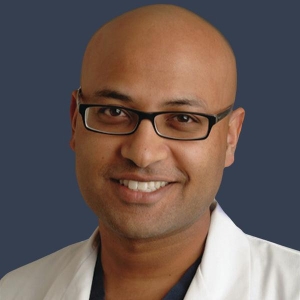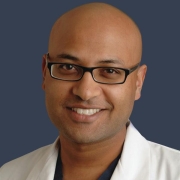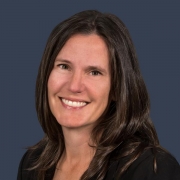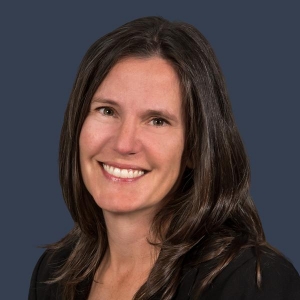People Profiles: Dr. Munish Goyal

Munish Goyal, MD, (Emergency Medicine)
Munish Goyal, MD, (Emergency Medicine) almost decided not to go into medicine. He even briefly changed his undergraduate major from biology to business. That is, until an experience shadowing a retinal surgeon during the AIDS epidemic in Washington, D.C., made a lasting impression on him.
It was 1994 and he wasn’t enjoying his science classes, particularly organic chemistry (a sentiment many pre-med students likely can appreciate). Dr. Goyal’s father reminded him that organic chemistry was not medicine and suggested he spend some time with a physician before making a final decision.
Dr. Goyal began to shadow a retinal surgeon who was seeing patients with AIDS retinopathy at the Whitman-Walter Clinic. “Watching him balance his scientific knowledge with the humanistic component made me realize this is what I want to do. I want to be able to understand the content well enough that I can explain to someone without any medical background what was happening with their body.”
As an attending physician in the Emergency Department at MedStar Washington Hospital Center and a Professor at the Georgetown University School of Medicine, helping his residents and medical students make these same connections is what he enjoys most in his day to day.
“Highlighting to people why all of the time and energy that they spent in medical school matters – drawing connections real time between that first or second year of medical school pharmacology and physiology and what they’re seeing in front of them – it makes it so much more interesting and more relevant,” he explains.
MedStar Health GME provides a highly unique and interesting place to learn and make those connections, according to Dr. Goyal. Because MedStar Washington Hospital Center sees patients from a large portion of the Washington, D.C., metro area, residents can see and do so much more than they might in another hospital and often have the opportunity to treat conditions that are less common.
Dr. Goyal holds a number of leadership positions at MedStar Health, including Director of the MedStar Medical Student Scholars Program for rising 2nd year Georgetown medical students. He’s also Chair of the MedStar Health Research Institute (MHRI) Institutional Review Board, co-Chair of the MedStar Health P+T Committee, and Director of Faculty Education, Research, and the Section of Critical Care for the emergency medicine service line.
He credits his inspiring mentors, incredible peers, and supportive wife as the things that have most helped him succeed at MedStar Health. And, at the end of the day, Dr. Goyal just really enjoys medical education.
“I like teaching. I get to be around residents and medical students, and they keep things fresh and interesting.”




